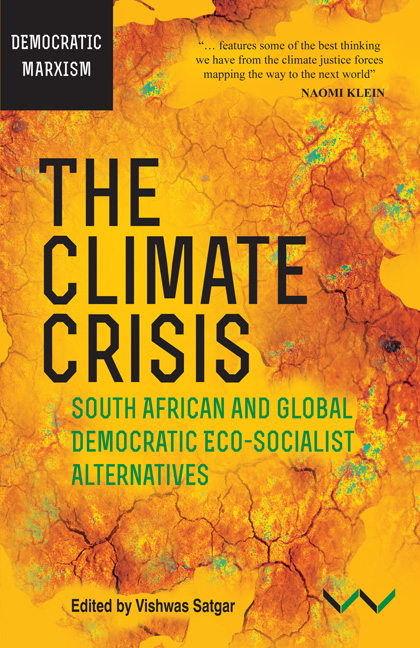Book contents
- Frontmatter
- Contents
- Tables and Box
- Acknowledgements
- Acronyms and Abbreviations
- Chapter 1 The Climate Crisis and Systemic Alternatives
- PART ONE THE CLIMATE CRISIS AS CAPITALIST CRISIS
- PART TWO DEMOCRATIC ECO-SOCIALIST ALTERNATIVES IN THE WORLD
- PART THREE DEMOCRATIC ECO-SOCIALIST ALTERNATIVES IN SOUTH AFRICA
- Chapter 10 The Climate Crisis and a ‘Just Transition’ in South Africa: An Eco-Feminist-Socialist Perspective
- Chapter 11 Energy, Labour and Democracy in South Africa
- Chapter 12 Capital, Climate and the Politics of Nuclear Procurement in South Africa
- Chapter 13 Climate Jobs at Two Minutes to Midnight
- Chapter 14 Deepening the Just Transition through Food Sovereignty and the Solidarity Economy
- Chapter 15 Eco-Capitalist Crises in the ‘Blue Economy’: Operation Phakisa's Small, Slow Failures
- CONCLUSION
- Contributors
- Index
Chapter 12 - Capital, Climate and the Politics of Nuclear Procurement in South Africa
from PART THREE - DEMOCRATIC ECO-SOCIALIST ALTERNATIVES IN SOUTH AFRICA
Published online by Cambridge University Press: 05 June 2019
- Frontmatter
- Contents
- Tables and Box
- Acknowledgements
- Acronyms and Abbreviations
- Chapter 1 The Climate Crisis and Systemic Alternatives
- PART ONE THE CLIMATE CRISIS AS CAPITALIST CRISIS
- PART TWO DEMOCRATIC ECO-SOCIALIST ALTERNATIVES IN THE WORLD
- PART THREE DEMOCRATIC ECO-SOCIALIST ALTERNATIVES IN SOUTH AFRICA
- Chapter 10 The Climate Crisis and a ‘Just Transition’ in South Africa: An Eco-Feminist-Socialist Perspective
- Chapter 11 Energy, Labour and Democracy in South Africa
- Chapter 12 Capital, Climate and the Politics of Nuclear Procurement in South Africa
- Chapter 13 Climate Jobs at Two Minutes to Midnight
- Chapter 14 Deepening the Just Transition through Food Sovereignty and the Solidarity Economy
- Chapter 15 Eco-Capitalist Crises in the ‘Blue Economy’: Operation Phakisa's Small, Slow Failures
- CONCLUSION
- Contributors
- Index
Summary
The imperative of moving away from fossil fuels begs a number of strategic questions in a largely coal-based electricity economy like South Africa. What would a ‘just transition’ look like? How do we debate this notion, what are its contents, how do we develop confidence in the concept, and who will act as a fair arbiter of its implementation?
In general, the South African government has strategically promoted further investment in coal. It is building two large-scale coal-fired power stations (of a capacity of 4 800 megawatt electric each), and encouraging rent seeking by black capitalists from new coal mines established in water-scarce areas on the country's finest arable land. At the same time, it seeks to invest in a number of alternative energy options, including renewables, carbon capture and storage, and additional nuclear energy, with gas (shale and imported liquefied natural gas) seen as a ‘transitional’ option.
In this chapter, I focus on the country's nuclear plans and argue that nuclear development is a false solution to climate change. Those who claim it is carbonneutral look only at the low generation of greenhouse gases in the reactor, while failing to take into account the entire nuclear fuel chain, in some stages of which carbon intensity is considerable.
Nuclear technology also compromises building future job opportunities in the energy sector. It is punitive in terms of costs and would add massively to the debt crisis facing South Africa. Finally, the adoption of further nuclear power is likely to add to energy dependency rather than building popular energy sovereignty, and will curtail energy democracy. It will feed into the extension of patrimonial politics and curb the building of democracy.
I look first at the relationship between crisis and nuclear procurement, and then examine some of the dilemmas raised by the procurement process itself. These extend from the formal policy-making process to the shadowy, less visible patrimonial politics that have characterised the Jacob Zuma presidency. Finally, I visit the relationship between democracy and nuclear energy.
THE CONTEXT OF CRISIS
South Africa is facing a multiplicity of interconnected crises. Its economy is failing its citizens: over twenty-seven per cent of the population is formally unemployed.
- Type
- Chapter
- Information
- Climate Crisis, TheSouth African and Global Democratic Eco-Socialist Alternatives, pp. 252 - 271Publisher: Wits University PressPrint publication year: 2018



